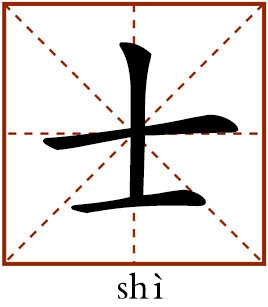Scholar-gentry

This character usually refers to a unique social class in ancient China. It is often translated into scholar-gentry, scholar elite or scholar-officials.
烈士暮年, 壮心不已
liè shì mù nián, zhuàng xīn bù yǐ
Lie shi refers to heroes or noble-hearted man. Mu nian means “advanced in years.” Zhuang xin refers to ambition or aspirations and bu yi means “never stop or cease.” This term refers to the image of a hero who is advanced in his years and in decline, but with his great aspirations still burning.
This is a line from the famous poem “Though Long May Live the Sacred Turtle” by Cao Cao (155–220), one of the greatest generals at the end of the Han Dynasty, who is also known for his literary achievements. “Though long may live the Sacred Turtle/ There is time it has to die./ The Flying Snake on mist arises/ At last to dust it has to turn./ The aged steed that lies in the stable/ Aspires to race a thousand miles./ The hero in his evening years/ Never lets droop his noble ideals./ It is not with Heaven alone that rests/ The fullness or abridgment of life./ By keeping peace of mind and body/ One will secure longevity” (trans. Roxane Witke).
In the first four lines of the poem, Cao refutes the immortality of the two mentioned mythical creatures and expresses his belief that everything is mortal. The next part of the poem shows that Cao does not become depressed by the inevitable future—aging and death. The old war-horse who still longs to gallop a thousand li and the noble-hearted man, who never abandons his proud aspirations, indicate that Cao was still energetic and vigorous even as he aged. The last part of the poem is a reflection by Cao on aging. He believes in the poem that mankind, despite our mortality, can still enjoy longevity by maintaining a good state of mind.
The significance of this poem does not only lie within its content, but also the breakthrough that it made in Chinese literature. During the Han Dynasty, under the predominant rule of Confucianism, most literati wrote poems in praise of rulers or Confucius. Poems springing from true feelings and emotions were neglected. It was Cao who brought an air of freedom into literary circles of the time.
edited by REN GUANHONG
